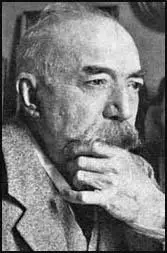Robert Blatchford

Robert Blatchford, the son of an actor, was born in Maidstone in 1851. Robert father died when he was two and at the age of fourteen he was apprenticed as a brushmaker. He disliked the work and ran away to join the army.
Blatchford reached the rank of sergeant major before leaving the service in 1878. After trying a variety of different jobs he became a freelance journalist. After working for several newspapers he became leader writer for the Sunday Chronicle in Manchester. It was his journalistic experience of working-class life that turned Blatchford into a socialist.
In 1890 Blatchford founded the Manchester Fabian Society. The following year, Blatchford and four fellow members launched a socialist newspaper, The Clarion. Blatchford, who was editor, announced that the newspaper would follow a "policy of humanity; a policy not of party, sect or creed; but of justice, of reason and mercy." The first edition sold 40,000 and after a few months settled down to about 30,000 copies a week.
It was decided in 1893 to publish some of Blatchford's articles about socialism as a book. Merrie England, was an immediate success, with the cheap edition selling over 2,000,000 copies. Influenced by the ideas of William Morris, Blatchford emphasized the importance of the arts and the values of the countryside. Considered to be an excellent example of socialist propaganda, the book was translated into several different languages.
Blatchford upset many of his socialist supporters by his nationalistic views on foreign policy. He supported the government during the Boer War and warned against what he saw was the German menace. Blatchford also changed his views on equal rights and strongly opposed the policies of the NUWSS and the WSPU.
After the First World War Blatchford moved to the right and became a passionate advocate of the British Empire. In the 1924 General Election he supported the Conservative Party and declared that Stanley Baldwin was Britain's finest politician. Robert Blatchford died on 17th December 1943.
Primary Sources
(1) Robert Blatchford, Merrie England (1894)
The question of Socialism is the most important and imperative question of the age. It will divide, is now dividing, society into two camps. In which camp will you elect to stand? On the one side there are individualism and competition - leading to a 'great trade' and great miseries. On the other side is justice, without which can come no good, from which can come no evil. On the one hand, are ranged all the sages, all the saints, all the martyrs, all the noble manhood and pure womanhood of the world; on the other hand, are the tyrant, the robber, the man-slayer, the libertine, the usurer, the slave-driver, the drunkard, and the sweater. Choose your party, then, my friend, and let us get to the fighting.
(2) Robert Blatchford, Merrie England (1894)
Socialists do not propose by a single Act of Parliament, nor by a sudden revolution, to put all men on an equality, and
compel them to remain so. Socialism is not a wild dream of a happy land, where the apples will drop off the trees into our open mouths, the fish come out ot the rivers and fry themselves for dinner, and the looms turn out ready-made suits of velvet with gold buttons, without the trouble of coaling the engine. Neither is it a dream of a nation of stained-glass angels, who always love their neighbours better than themselves, and who never need to work unless they wish.
Socialism is a scientific scheme of national organization, entirely wise, just, and practical. It is a kind of national cooperation. Its programme consists, essentially, of one demand, that the land, and all other instruments of production and exchange, shall be the common property of the nation, and shall be used and managed by the nation for the nation.
(3) Philip Snowden, An Autobiography (1934)
In the 1890s Robert Blatchford was attracting recruits to the movement by his vigorous socialist writings. He established The Clarion, a weekly socialist and literary journal, and written Merrie England, a popular textbook on socialism written in the simple and vigorous English of which he was such a master. This book, which extended to two hundred pages, was published in a penny edition, which had a sale of a million copies. No man did more than he to make socialism understood by the ordinary working man. He based his appeal on the principles of human justice. He preached socialism as a system of industrial co-operation for the common good. His arguments and illustrations were drawn from facts and experiences within the knowledge of the common people.
(4) J. R. Clynes, Memoirs (1937)
Robert Blatchford was a unique spirit. On the platform, he was awkward, shy and ineffective. But with his pen, he could make labourers understand higher economics! He wrote Merrie England and other brilliant propagandist books; for a dozen years or more, he was Labour's chief recruiting officer.
